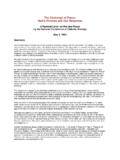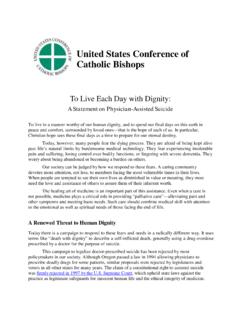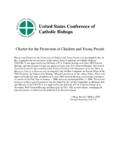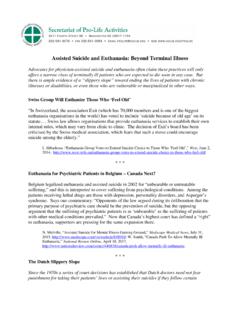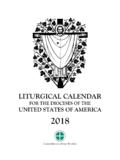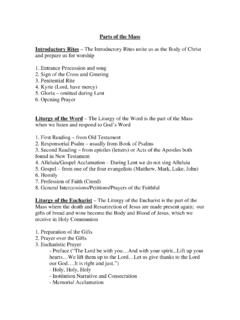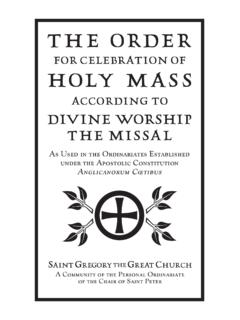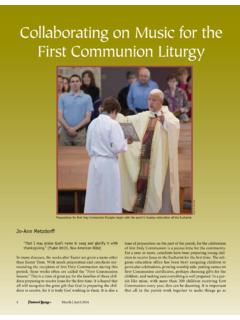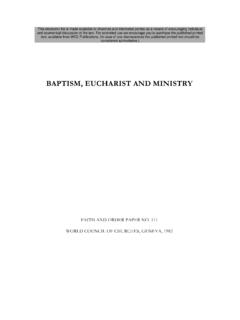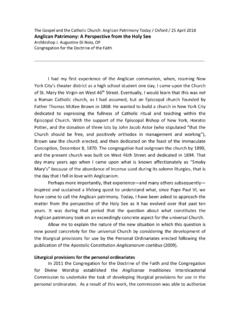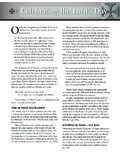Transcription of ROman Missal Bulletin Inserts - United States …
1 Liturgical ParticipationThe celebration of Mass is an act of the whole assembly gathered for worship . In the Mass, the Church is joined to the action of Christ. We are joined to this divine action through Baptism, which incorporates us into the risen Christ. This action, which lies at the center of the whole of Christian life (General Instruction of the ROman Missal [GIRM], no. 16), is initiated not by us but by God acting in and through the Church as the Body of the risen Christ. The Liturgy is designed to bring about in all those who make up the worshiping assembly a participation of the faithful, namely in body and in mind, a participation fervent with faith, hope, and charity (GIRM, no.)
2 18). To the extent that we are able to participate in this way, the work of redemption becomes personally effective for each of us. By such participation we make the actions and prayers of the Liturgy our own; we enter more fully into our personal communion with Christ s redeem-ing act and perfect worship . In the celebration of Mass the faithful form a holy people, a people of God s own possession and a royal Priesthood, so that they may give thanks to God and offer the unblemished sacri cial Victim not only by means of the hands of the Priest but also together with him and so that they may learn to offer their very selves.
3 They should, moreover, take care to show this by their deep religious sense and their charity toward brothers and sisters who participate with them in the same celebration.. Moreover, they are to form one body, whether in hearing the word of God, or in taking part in the prayers and in the singing, or above all by the common offering of the Sacri ce and by participat-ing together at the Lord s table (GIRM, nos. 95, 96). The participation of each person in the Liturgy is important. Each person needs to do his or her MiNiSTRieS iN The liTURGYB ishops and priests are called to act in the Liturgy in the very person of Christ, on behalf of his people, pronounc-ing the most sacred prayers of our faith, presiding over the celebration of the sacred mysteries, explaining God s Word and feeding God s People on the Body and Blood of Christ.
4 A bishop has the added responsibility of being the chief shepherd, the principal liturgist of his diocese in his role as the successor of the Apostles. By God s grace others are ordained to the ministry of deacon. In the celebration of the Mass deacons proclaim the Gospel, occasionally preach the homily, and assist the bishop and priest in exer-cising their sacred liTURGiCal MiNiSTRieSIn addition to the ordained ministries, some roles in the Liturgy are exercised by lay people who place their time and talent at the service of the liturgical assembly as aco-lytes (altar servers), lectors, extraordinary ministers of Holy Communion, cantors, choir members, instrumentalists, leaders of song, and ushers.
5 Others contribute their time and talent to planning and organizing the Liturgy; to keep-ing the church and the vestments, vessels, and appoint-ments clean and well ordered; or to providing decorations that refl ect the spirit of the liturgical feast or is variety of offi ces and roles is desirable and should be maintained. It is desirable that individuals function in roles of service at Mass. For example, if a deacon is pres-ent, the priest celebrant or a concelebrant should not read the Gospel. Th e lector should not take on the role of a server or an extraordinary minister of Holy Communion. A wide variety of services needs to be performed, and it is preferable that diff erent individuals exercise those services so that the talents and gifts God has placed within the Christian community are fully used and that these roles of service are not monopolized by a ose engaged in liturgical roles need to be well pre-pared for those roles and to know how to carry them out with reverence, dignity, and understanding.
6 Receiving the proper preparation requires a further gift of time on the part of the person being prepared as well as on the part of those in the parish responsible for the training of liturgical ministers. Finally, the practical task of assign-ing individuals to particular Masses and organizing the distribution of roles is another indispensable element in the fabric of well-ordered liturgical ministry in a the baptized need to understand that part of their duty regarding the Liturgy is to accept some responsibility for the Liturgy, to place themselves and their God-given talents at the service of the liturgical community whenever possible.
7 Whether one brings up the gifts at the Presentation; reads the Word of God; assists with the distribution of Communion and brings the Eucharist to those unable to be present at Mass; serves at the altar; provides music that augments the joy, solemnity, and festivity of the celebration; or serves the assembled community as an usher, he or she is contrib-uting to the worship of the community and fulfilling the responsibility that comes with all members of the parish community will have the time, energy, strength, or ability to serve in these roles. However, individuals must be careful not to excuse themselves too easily.
8 What is important is that all understand that the celebration of Liturgy is not just the responsibility of the pastor, although he is delegated by the bishop to oversee the liturgical life of the parish. Pas-tors need the help of people who are serious about living out their baptismal right and responsibility to Role of The BapTizedThis catalog of specialized roles might give the impres-sion that those who are not exercising one of these roles are free to sit back passively and simply let the Liturgy happen around them. Nothing could be further from the truth. Those who come together for Liturgy do not have the luxury of acting as spectators, waiting for all to be done for them.
9 Full, conscious, and active participa-tion in the Liturgy (as commended by the Second Vati-can Council) is not only their right but also their duty and their responsibility. That responsibility includes full engagement throughout the liturgical celebration. The baptized faithful who form the congregation are called to join in praise and thanksgiving in song and spoken word, to listen attentively to God s Word, and to exercise their baptismal priesthood in prayer for the Church, the world, and all in need during the Prayer of the Faithful. In the Liturgy of the Eucharist the baptized faithful join their prayer to that of the priest celebrant, offering Christ the Victim, not only by means of the hands of the Priest but also together with him, and offer themselves as well (GIR M, no.)
10 95). Their participation culminates in the reception of the Body and Blood of the Lord, the sacrament that unites them more fully with Christ their Head and with one another. We need to be aware, there-fore, that participation does not refer primarily to exter-nal activity or function during the celebration of Mass; rather, it refers to a deeply spiritual, interior participation of mind and heart, filled with devotion and penetrating the very depths of the mysteries we their sincere efforts to participate, those present minister to the priest celebrant, to others who serve in liturgical roles, and to one another. Their attention and active engagement in the celebration can draw from the priest celebrant and the other ministers the best they have to offer.


